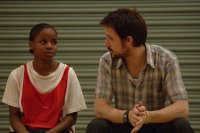Written by Derek Cianfrance, Joey Curtis and Cami Delavigne
Directed by Derek Cianfrance
Starring Ryan Gosling and Michelle Williams

Cindy: How do you trust your feelings when they can just disappear like that?
Gramma: I think the only way to find out is to have those feelings.
When they say, “For better of for worse,” in wedding vows, I believe they are referring to BLUE VALENTINE in regards to the worse part. Novice feature filmmaker, Derek Cianfrance’s latest is a very particular snapshot of a very specific place in a relationship that far too many people know far too well. And only few of those people live to tell the tale with their wits still about them. In reality, this space is an incredibly difficult test of the mind, the spirit and the heart and every effort is usually made to avoid getting there. It is one of the darkest stages a relationship can reach but Cianfrance is not the least bit afraid of the dark.

Ryan Gosling and Michelle Williams, an indie dream couple if I’ve ever heard one before, are Dean and Cindy, a young couple with a little girl, living their married life in rural Pennsylvania. They have been together for six years but those years have been far from kind. At the moment we meet them, Dean is feeding his daughter breakfast while Cindy is getting ready for work – an ordinary morning for many a couple, I’m sure. The difference here is that this kitchen is weighted down with a crushing tension that is evident in every look given and every word spoken. She seems appalled by his every action and influence over their daughter and he seems to know it. The room is rotten with the stench of hatred.

Dean and Cindy know they don’t have much time left and decide to get a room at a cheap motel in New York City for the night in hopes of working through their issues and rekindling their romance. Their intentions are sincere but the fight is so insurmountable at times, they each struggle with their resolve. Gosling, while somewhat overwrought in his character’s intensity, must be commended for the amount of evident effort he made to make Dean real and not just a bad husband. That said, Williams is heartbreaking every moment she is on screen. Even the manner in which she clasps her fists during one of the film’s many sexual moments is emotionally devastating. Together, they genuinely feel like two people who have been oscillating between love and hate for years, so much so that it can be too much to take at times.

Cianfrance is a brave man for going to as many places of despair in BLUE VALENTINE as he does but he’s not stupid. He knows that an audience needs to breathe so he tells the entire story of their relationship in moments so that we can see that there once was a time when these two knew happiness, that there is another reason other than their daughter that they are fighting to stay together. The device is somewhat manipulative at times as its obvious point is to make us feel even worse that their relationship doesn’t seem to be salvageable. BLUE VALENTINE did make me feel pretty bad. I had been in some variation of that relationship in my life and it was hard enough to deal with then so, as fantastic as the film is in its most candid moments, I’m not sure everyone is ready to go back there again.











